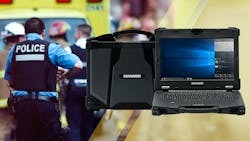The ability to be connected has become critical for today’s law enforcement officer, and rugged computers are ideal for the outdoor environment that field officers operate in. They provide versatility and portability. And most importantly, they are designed and built to work in environments that commercial computers would never survive. The challenge is finding a rugged computing system that meets the requirements of your department and is also affordable.
Officers in the field utilize their computers for everything from running license plates as they drive to tapping into the department’s databases and filing reports. Being able to do these tasks seamlessly and reliably is key to their ability to do their jobs efficiently and successfully. These rugged mobile devices provide law enforcement with the tools that they need to serve and protect.
Rugged computers come survival tested to withstand the daily challenges of drops, vibration, moisture, water, dust, and other aspects of working in the community. They easily handle those rough rides in a vehicle and over paths that pass as roads. They work effortlessly in challenging, harsh environments. They don’t sweat the heat, nor turn numb in the bitter cold.
There are also two classes of rugged computers, fully rugged and semi-rugged, so departments have the flexibility to purchase the rugged computer or tablet that best fits their requirements. There are several things to consider when determining what rugged computer is best for you.
Durability. What makes a rugged computer “rugged”? Rugged computers come survival tested. Testing procedures have already proven that it can withstand drops, rough rides, moisture, water, and dust. To prove that, it will have a MIL-STD-810G rating, which assures shock, drop, and vibration protection, as well as the ability to withstand use in a wide range of temperatures.
Look for rugged computers that come with a fanless design because they increase reliability and durability, but decrease power usage.
It should also carry an IP rating, which ensures the unit from damaging water and dust intrusion. This means that users will be able to regularly disinfect their computers using wipes and standard cleaners in light of the coronavirus (COVID-19).
Connectivity. Once your department’s new mobile work companion has proved its ruggedness, its ability to wirelessly connect to the rest of the world needs to be considered. Something along the line of an integrated fast, energy-efficient Intel processor combination provides excellent coverage and will keep you in touch. Also, WWAN connectivity will allow your users access to LTE networks for expanded coverage and built-in GPS for tracking. With the expansion of FirstNet and other public safety-specific networks, secure connectivity is becoming commonplace for departments.
Security. With hacking on the rise, it’s almost a given that some ‘bad actors’ from somewhere in the world will target your department sooner or later. The better your security, the more secure your information will be. Some robust security features to look for include: TPM (Trusted Platform Module), Intel vPro, a smart card reader, RFID reader, fingerprint scanner, and a Kensington lock. The TPM 2.0 chip is a platform authentication and a biometric fingerprint scanner that quickly identifies and verifies users.
What else?
- Since the unit will more than likely be used outdoors, a sunlight-readable display is a must, especially for anyone working in the bright, mid-day sun, or even indoors under glaring lighting. Most displays today used with rugged computers are high definition, which provides clear, crisp, easy-to-view images.
- Since officers often wear gloves, make sure the touchscreen can accommodate them.
- Have a powerful enough processor to do what you need the unit to do
- Have enough battery life for the unit and to last the shift. Will you have it docked in a patrol vehicle, or does it need to operate on battery power alone?
- RFID and smart card can be used for dual authorization.
- Barcode readers allow the integration of drivers license readers for faster identification.
- With the global challenges facing businesses from the coronavirus, it is essential to work with a partner who can deliver the rugged computer when and where you need them. The COVID-19 crisis has disrupted both business and the supply chain globally, look for a partner that has both the manufacturing and customer service capability to meet your needs in these challenging times.
- Finally, be sure to check out the unit’s warranty. How much does it cover, and for how long? You shouldn’t have a problem with reputable companies in the industry. For instance, look for a company that offers a three-year warranty for their rugged computers, with coverage specific to semi-rugged and fully-rugged models.
Rugged computers and tablets have become an indispensable necessity for any job that requires working outside of the office. Law enforcement has benefited from the use of rugged computers to increase productivity and quality of service. It provides real-time information both to and from the community. Rugged computers increase the efficiency and productivity of law enforcement while furthering their mission to “protect and serve.”
Tom Wang | President, Durabook Americas, Inc.
Tom Wang has been instrumental in the development of the rugged computing product line for the Americas. He leads the Durabook commercial business unit based in Fremont, CA, as President. Mr. Wang's career has spanned over 20 years, and he previously worked with Getac in product development, product marketing, and business development.



